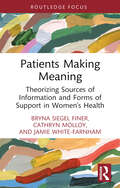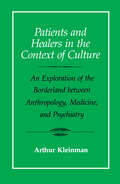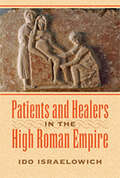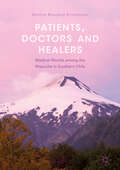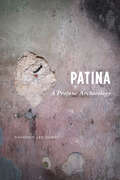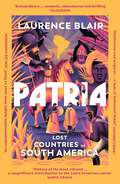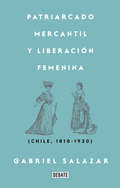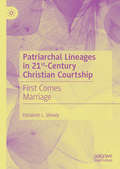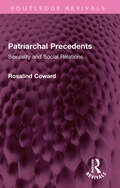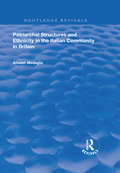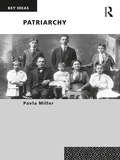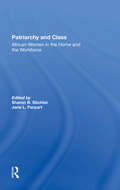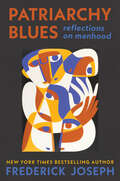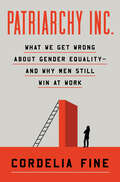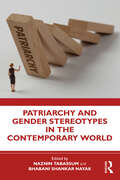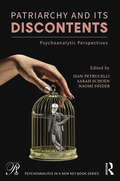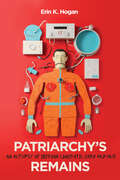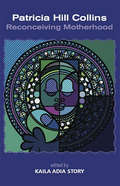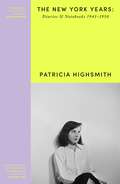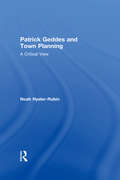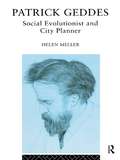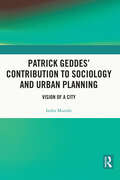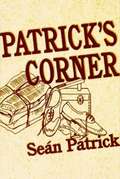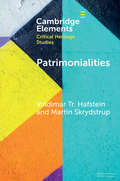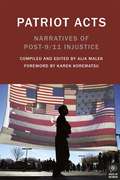- Table View
- List View
Patients Making Meaning: Theorizing Sources of Information and Forms of Support in Women’s Health (Routledge Studies in Rhetoric and Communication)
by Jamie White-Farnham Bryna Siegel Finer Cathryn MolloyThis book explores how women make meaning at various health flashpoints in their lives, overcoming fear, anxiety, and anger to draw upon self-advocacy, research, and crucial decision-making.Combining focus group research, content analysis, autoethnography, and textual inquiry, the book argues that the making and remaking of what we call “patient epistemologies” is a continual process wherein a health flashpoint—sometimes a new diagnosis, sometimes a reoccurrence or worsening of an existing condition or the progression of a natural process—can cause an individual to be thrust into a discourse community that was not of their own choosing.This study will interest students and scholars of health communication, rhetoric of health and medicine, women’s studies, public health, healthcare policy, philosophy of medicine, medical sociology, and medical humanities.
Patients and Healers in the Context of Culture: An Exploration of the Borderland between Anthropology, Medicine, and Psychiatry (Comparative Studies of Health Systems and Medical Care #5)
by Arthur KleinmanFrom the Preface, by Arthur Kleinman:Patients and Healers in the Context of Culture presents a theoretical framework for studying the relationship between medicine, psychiatry, and culture. That framework is principally illustrated by materials gathered in field research in Taiwan and, to a lesser extent, from materials gathered in similar research in Boston. The reader will find this book contains a dialectical tension between two reciprocally related orientations: it is both a cross-cultural (largely anthropological) perspective on the essential components of clinical care and a clinical perspective on anthropological studies of medicine and psychiatry. That dialectic is embodied in my own academic training and professional life, so that this book is a personal statement. I am a psychiatrist trained in anthropology. I have worked in library, field, and clinic on problems concerning medicine and psychiatry in Chinese culture. I teach cross-cultural psychiatry and medical anthropology, but I also practice and teach consultation psychiatry and take a clinical approach to my major cross-cultural teaching and research involvements. The theoretical framework elaborated in this book has been applied to all of those areas; in turn, they are used to illustrate the theory. Both the theory and its application embody the same dialectic. The purpose of this book is to advance both poles of that dialectic: to demonstrate the critical role of social science (especially anthropology and cross-cultural studies) in clinical medicine and psychiatry and to encourage study of clinical problems by anthropologists and other investigators involved in cross-cultural research.
Patients and Healers in the High Roman Empire
by Ido IsraelowichA comprehensive study of both patients and healers in the High Roman Empire.Patients and Healers in the High Roman Empire offers a fascinating holistic look at the practice of ancient Roman medicine. Ido Irsaelowich presents three richly detailed case studies—one focusing on the home and reproduction; another on the army; the last on medical tourism—from the point of view of those on both sides of the patient-healer divide. He explains in depth how people in the classical world became aware of their ailments, what they believed caused particular illnesses, and why they turned to certain healers—root cutters, gymnastic trainers, dream interpreters, pharmacologists, and priests—or sought medical care in specific places such as temples, bath houses, and city centers. The book brings to life the complex behavior and social status of all the actors involved in the medical marketplace. It also sheds new light on classical theories about sickness, the measures Romans undertook to tackle disease and improve public health, and personal expectations for and evaluations of various treatments. Ultimately, Israelowich concludes that this clamoring multitude of coexisting forms of health care actually shared a common language. Drawing on a diverse range of sources—including patient testimonies; the writings of physicians, historians, and poets; and official publications of the Roman state—Patients and Healers in the High Roman Empire is a groundbreaking history of the culture of classical medicine.
Patients, Doctors and Healers
by Dorthe Brogård KristensenRecognizing the interplay between biomedicine and indigenous medicine among the Mapuche in Southern Chile, this book explores notions of culture and personhood through the bodily experiences and medical choices of patients. Through case studies of patients in the context of medical pluralism, Kristensen argues that medical practices are powerful social symbol indicative of overarching socio-political processes. As certain types of extreme and violent experiences–known as olvidos–lack a framework that allows them to be expressed openly, they therefore surface as symptoms of an illness, often with no apparent organic pathology. In these contexts, indigenous medicine, thanks to its sensitivity to socio-political contexts, provides a space for articulation and management of collective experiences and suffering among patients in Southern Chile.
Patina: A Profane Archaeology
by Shannon Lee DawdyWhen Hurricane Katrina struck New Orleans, the world reacted with shock on seeing residents of this distinctive city left abandoned to the floodwaters. After the last rescue was completed, a new worry arose--that New Orleans's unique historic fabric sat in ruins, and we had lost one of the most charming old cities of the New World. In Patina, anthropologist Shannon Lee Dawdy examines what was lost and found through the destruction of Hurricane Katrina. Tracking the rich history and unique physicality of New Orleans, she explains how it came to adopt the nickname "the antique city." With innovative applications of "thing theory," Patina studies the influence of specific items--such as souvenirs, heirlooms, and Hurricane Katrina ruins--to explore how the city's residents use material objects to comprehend time, history, and their connection to one another. A leading figure in "archaeology of the contemporary," Dawdy draws on archaeological evidence, archival and literary texts, and dozens of post-Katrina interviews to explore how the patina aesthetic informs a political nostalgia that is critical of the present. An intriguing study of the power of everyday objects, Patina demonstrates how sharing in the care of a historic landscape can unite a city's population--despite extreme divisions of class and race--and help envision a way of life that offers not a return to the past, but an alternative future.
Patria: Lost Countries of South America
by Laurence BlairA spellbinding history of South America, as heard on hit podcast The Rest Is History'Absolutely wonderful' DOMINIC SANDBROOK'A luscious, erudite romp ... a tour de force of literary mezcla' ALICE ALBINIA'An unputdownable delight' JON LEE ANDERSON'A magnificent contribution to the Latin American canon' MARIE ARANAIn this sweeping exploration of the continent's forgotten past, Laurence Blair takes as his waymarks nine countries that can’t be found on a map: vanished realms, half-imagined utopias and dismembered homelands. Looking beyond modern borders, he travels to each in turn – on foot and horseback, by rail and river – to weave an epic of survival, resistance and revolution.Blair’s journey spans five centuries and thousands of miles, ranging from ancient Amazonian civilisations and a rebel Inca dynasty in the Peruvian jungle – via a Brazilian Wakanda that defied slavery, Bolivia’s landlocked navy and the Patagonian power that defeated the Spanish Empire – to the African freedom fighters who marched over the Andes from Argentina, and the Napoleon of the New World who led Paraguay to its ruin.This is the story of South America as is rarely told: at the epicentre of global history and the forging of the modern world.
Patriarcado, Mercantil y Liberación Femenina: Chile (1810-1930)
by Gabriel Salazar VergaraPatriarcado, Mercantil y Liberación Femenina Chile (1810-1930)
Patriarchal Lineages in 21st-Century Christian Courtship: First Comes Marriage
by Elizabeth L. ShivelyDrawing from a study of courtship media and ethnographic work at purity retreats and home-school conventions across the Midwest, this is the first inquiry into modern Christian courtship, an alternative to dating that asks young people to avoid both romance and sex until they are ready to be married. Bridging sociological and historical studies of American Christianity with youth and girlhood studies literatures, Elizabeth Shively finds that the courtship system is designed to shore up the patriarchal nuclear family structure at the center of conservative Christianity and ensure predictability in the face of emerging adulthood: single young women work to embody ideals of “luminous femininity” and model themselves after archetypes such as the “Proverbs 31 woman,” the “stay-at-home-daughter,” and the “mission-minded girl,” and courting couples strive to “guard their hearts” against premature emotional intimacy. Nonetheless, participants report that courtship, like other relationships, inevitably carries an element of risk, and it ultimately fails to offer a substantial challenge to the to the sexist realities of youth dating culture.
Patriarchal Precedents: Sexuality and Social Relations (Routledge Revivals)
by Rosalind CowardFirst published in 1983, Patriarchal Precedents is an excavation of the term patriarchy. Rosalind Coward shoes how the debates about patriarchy and matriarchy were crucial to social theories in the nineteenth century, discussing how the resolution of these debates resulted in our present ways of (mis)understanding the family, sexual relations and sexual characteristics. Rosalind Coward argues that the violent debates around patriarchy tell a salutary tale about how the term presupposed as much as it set out to explain. She demonstrates how it was used in Marxism and psychoanalysis in ways which blocked any radical thinking about sexual relations, and how the arguments against the term patriarchy within anthropology still have to be taken seriously. She argues that in order to advance our understanding of how power is exercised in sexual relations, of the place which sexual relations have within society and the construction of sexual characteristics, a series of presuppositions about sexual relations must now be cleared away. This book will be of interest to students of gender studies, women's studies, sexuality, men' s studies, sociology and anthropology.
Patriarchal Structures and Ethnicity in the Italian Community in Britain
by Azadeh MedagliaFirst published in 2001, this book retraces the chronological history of the Italian Diaspora community in Britain from its inception in the eighteenth century to the present. The author describes the immigrants’ way of life, patterns of occupation, gender relations and modes of integration in the host country. In addition, the book focuses on the role of religion, an institution which has traditionally reinforced both Italian cultural identity and unequal gender relations. Until now, most ethnic studies have been carried out on racialized minorities - those with physical differences - and they have generally failed to emphasize the gender relations within minority communities.
Patriarchy
by Pavla Miller"In this major contribution to European social history, Miller has succeeded in doing to history what Richard Wagner did to music -- weaving together powerful motifs with dramatic results. " -- Choice"[Miller's book] wrestles with issues as basic as the historical construction of the Western personality and its connections with how Western societies have organized the state, the economy, the family, and intimate everyday life. " -- MaryJo MaynesThis wide-ranging study of familial, political, and economic change in the West between the sixteenth and the nineteenth centuries is organized around the two themes of the fall of a patriarchalist social order and the reformist movement to instill self-mastery into subject populations -- and how those societal shifts transformed state school systems.
Patriarchy And Class: African Women In The Home And The Workforce (African Modernization And Development Ser.)
by Jane Parpart Sharon B StichterThis book argues for the applicability of a materialist mode of production analysis to the situation of women in Africa. It briefly reviews some of the intellectual background and current theoretical dilemmas of marxism-feminism.
Patriarchy Blues: Reflections on Manhood
by Frederick Joseph"[A] scorching treatise on toxic masculinity. Joseph’s critiques of “the patriarchy... both overt and ingrained” are razor-sharp, but it’s the clear-eyed reckoning of his own place within it that tethers the soul of his book." —Publishers Weekly"Joseph has learned a great deal from bell hooks here, and I think she would be proud because Patriarchy Blues is such a moving, inspiring, rigorous vision for living.” —Robert Jones, Jr., New York Times bestselling author of The ProphetsIn this personal and poignant collection, the author of the New York Times bestseller The Black Friend examines the culture of masculinity through the lens of a Black man. What does it mean to be a man today? How does the pervasive yet elusive idea of “toxic masculinity” actually reflect men’s experiences—particularly those of color—and how they navigate the world?In this thought-provoking collection of essays, poems, and short reflections, Frederick Joseph contemplates these questions and more as he explores issues of masculinity and patriarchy from both a personal and cultural standpoint. From fatherhood, and “manning up” to abuse and therapy, he fearlessly and thoughtfully tackles the complex realities of men’s lives today and their significance for society, lending his insights as a Black man.Written in Joseph’s unique voice, with an intelligence and raw honesty that demonstrates both his vulnerability and compassion, Patriarchy Blues forces us to consider the joys, pains, and destructive nature of manhood and the stereotypes it engenders.
Patriarchy Inc.: What We Get Wrong About Gender Equality?and Why Men Still Win at Work
by Cordelia FineA razor-sharp and quick-witted analysis of why we need a new approach to fixing the gender inequality embedded in work. Work remains much as it always has: men occupy the vast majority of leadership roles and are overrepresented in positions from engineer to plumber. We see many jobs as "male" or "female," with women dominating in healthcare and childcare professions. Pretending that this is the natural state of things—or that, instead, both sexes should submit to working 24/7—is just not right. In Patriarchy Inc., Cordelia Fine examines with razor-sharp and quick-witted analysis why gender inequality is embedded in the workplace and why it has to change. Drawing on theories from evolutionary science, psychology, economics, and sociology, she examines two of the most prominent movements in the corporate world. The Different But Equal viewpoint espouses that women are in the jobs they want despite their lower status and salaries. In the meantime, DEI (Diversity, Equity, Inclusion) has become a slogan that emphasizes productivity and profit, not fair play. Fine shows how both are wrong and the bad effects on everyone when men are still stuck in traditional breadwinner roles and women are having to fight for their due. Offering perceptive and much-needed insight into the current state of work, Patriarchy Inc. explores how we can get closer to achieving equality, even if it means upturning business as usual.
Patriarchy and Gender Stereotypes in the Contemporary World
by Naznin TabassumPatriarchy and Gender Stereotypes in the Contemporary World offers a thorough analysis of the stereotyping of women, particularly in organisations and higher education. The book considers both theoretical and empirical evidence and articulates the potential for transforming perceptions of women at work and in society, emphasising the importance of understanding the pictures created in our heads by gender stereotypes and their impact both positively and negatively on the status of women. In addition, the authors consider gender stereotypes from different countries and generations, providing a uniquely detailed description of how patriarchy operates across cultures and time. The book is a key textbook and research reference for students, researchers, policymakers, academicians, and activists working on gender studies.
Patriarchy and Its Discontents: Psychoanalytic Perspectives (Psychoanalysis in a New Key Book Series)
by Jean Petrucelli Sarah Schoen Naomi SniderThis anthology of interviews and essays joins luminaries in contemporary psychoanalysis with pioneers of feminism to provide a timely analysis of the crushing effects of patriarchy and the role that psychoanalysis can play in moving us into a future defined by mutuality and respect. Departing from the contemporary psychoanalytic view that the socio-political and intrapsychic are inextricably linked, contributors use psychoanalysis as a tool to demystify and even dismantle patriarchy, while also examining how our theories, practices, and institutions have been implicated in it. The issues under examination here include important and often under-theorized topics such as institutional responses to boundary violations, the search for a black-feminist psychoanalytic theory, patriarchal enactments within the trans community, the persistence of patriarchy within contemporary psychoanalysis, and the impacts of patriarchy on diverse patient populations and ways to address this clinically. This book represents the first anthology comprised of voices from both within and outside the psychoanalytic realm, outlining a contemporary feminist psychoanalysis for both an analytic and non-analytic audience. It is invaluable for both psychoanalysts and for those in gender studies wishing to draw on psychoanalytic thinking.
Patriarchy’s Remains: An Autopsy of Iberian Cinematic Dark Humour (McGill-Queen's Iberian and Latin American Cultures Series #8)
by Erin K. HoganSomething is rotten in the state of Spain. The uninterred corpse of a patriarchal figure populates the visual landscapes of Iberian cinemas. He is chilled, drugged, perfumed, ventilated, presumed dead, speared in the cranium, and worse.Analyzing a series of Iberian cinematic dark comedies from the 1950s to the present day, Patriarchy’s Remains argues that the cinematic trope of the patriarchal death symbolizes the lingering remains of the Francisco Franco dictatorship in Spain (1939–75). These films, created as satirical responses to persisting economic, social, and political issues, demonstrate that Spain’s transition to democracy following the Francoist period is an incomplete and ongoing process. Within the theme of patriarchal decay, the significance of the figure differs across cinematic representations, from his indispensability to his obstructionism and exploitation. Erin Hogan traces the prevalence of patriarchal death by analyzing its relationship with the surrounding characters who must depend on the deceased. Hogan demonstrates how the patriarch’s persistence in film both reveals and challenges an array of discriminations and inequalities in the cinematic grotesque tradition, in Iberian cinemas more broadly, and in Iberian society as a whole.Despite Spain’s ongoing transition towards democratic pluralism, Patriarchy’s Remains serves as a reminder that the remnants of an entrenched although not interred patriarchal culture continue to haunt Iberian society.
Patrica Hill Collins; Reconceiving Motherhood: Reconceiving Motherhood
by Kaila Adia StoryPatricia Hill Collins has given new meaning to the institution of motherhood throughout her publishing career. Introducing scholars to new conceptions, such as, “othermothering” and “mothering of mind,” Collins through her creative and multifaceted analysis of the institution of motherhood, has in a large sense, reconceived what it means to be a mother in a national and transnational context. By connecting motherhood as an institution to manifestations of empire, racism, classism, and heteronormativity, Collins has informed and invented new understandings of the institution as a whole. This anthology explores the impact/influence/ and/or importance of Patricia Hill Collins on motherhood research, adding to the existing literature on Motherhood and the conceptions of Family. In addition, this collection raises critical questions about the social and cultural meanings of race, class, gender, sexual orientation, and mothering.
Patricia Highsmith: The New York Years, 1941–1950
by Patricia Highsmith'My secrets - the secrets that everyone has - are here, in black and white.'Before Alfred Hitchcock adapted her debut novel, Strangers on a Train, for the big screen; before Thomas Ripley snaked his way into the canon of psychological suspense; before Carol became a cult classic of romantic obsession, who was Patricia Highsmith?Beginning in 1941 and encompassing Highsmith's adventurous twenties, The New York Years is an intimate self-portrait of a young artist, reading voraciously and honing her craft, intertwined with scenes from her dizzying social life, rife with sleepless nights spent in the queer bars of Greenwich Village.This condensed edition of Highsmith's monumental Diaries and Notebooks offers all the pleasures of her fiction, along with an unparalleled insight into the life, mind and times of this enigmatic, iconic, trailblazing author. 'One of the most observant and ecstatic accounts . . . about being young and alive in New York City' New York Times
Patrick Geddes and Town Planning: A Critical View
by Noah Hysler-RubinPatrick Geddes is considered a forefather of the modern urban planning movement. This book studies the various, and even opposing ways, in which Geddes has been interpreted up to this day, providing a new reading of his life, writing and plans. Geddes' scrutiny is presented as a case study for Town Planning as a whole. Tying together for the first time key concepts in cultural geography and colonial urbanism, the book proposes a more vigorous historiography, exposing hidden narratives and past agendas still dominating the disciplinary discourse. Written by a cultural geographer and a town planner, this book offers a rounded, full-length analysis of Geddes' vision and its material manifestation, functioning also as a much needed critical tool to evaluate Modern Town Planning as an academic and practical discipline. The book also includes a long overdue model of his urban theory.
Patrick Geddes: Social Evolutionist and City Planner
by Helen MellerOne of the great social thinkers of the late nineteenth and early twentieth century, Sir Patrick Geddes (1854-1932) enjoyed a career of astonishing diversity. This new analysis of his life and work reviews his ideas and philosophy of planning, providing a scholarly yet accessible account for those interested in the history of planning, urban design, social theory and nineteenth century British history.
Patrick Geddes’ Contribution to Sociology and Urban Planning: Vision of A City
by Indra MunshiThis book explores Patrick Geddes’s significant contributions to urban planning and sociology. His vision of the city, rooted in the principles of social development and preservation of cultural and ecological resources, has inspired generations of urban planners, architects and social scientists engaged with contemporary urban issues. The book discusses Geddes’ early experiments with urban renewal in Edinburgh, the famous Cities and Town Planning Exhibition and his work in India for the improvement of cities and towns with minimal financial and human cost. It examines the theoretical underpinnings of his ideas in relation to issues such as better housing and health; the preservation of history and culture; the role of a citizen; university and urban renewal; and the contemporary urban ecological crisis among others. Furthermore, it looks at the question of sustainability in the context of Geddes’ vision of a more humane, social, natural, and aesthetic town and city. A comprehensive review of Patrick Geddes’s ideas, this book underlines the relevance of his work to contemporary urban concerns and issues, especially in India. It will be of interest to scholars and researchers of sociology, urban studies, city planning, urban sociology, architecture, human geography, urban geography, settlement studies, development studies and environmental sustainability.
Patrick's Corner
by Seán Patrick[Back cover] "Upon reaching their "two-digit" birthdays, the six Patrick brothers became "Associate Breadwinners" in order to help out their widowed mother and earn a little money to jingle in their pockets. Patrick's Corner, the busiest street corner in town, was so named by the Patricks because they had a sort of monopoly on working the crowded locale, shining shoes and hawking the evening newspaper. With age, when one brother would move on to more lucrative pastures, the next Patrick in line would take over his job. Sean Patrick, the baby of the family, tells the story of his "comin' up" in an Irish Catholic family that was financially poor, but rich with guidance, love, respect, and support. Patrick's Corner is a collection of stories about growing up after World War II in a world where family life, neighborhood interdependence, and nurturing environments were the norm. With a strong emphasis on familial relationships, Patrick's Corner shows the best side of people living in crowded poverty as a reminder that the family has always been the basic strength of America. Almost everyone will find something to relate to in this book, whether it is the struggle for self-identity, the family's faith in God, or the tendency of older siblings to act like parents. Even if you have never had to wear hand-me-down clothes or been referred to as So-and-So's little brother or sister, these stories are sure to touch your heart. Told with sensitivity and humor, this nostalgic and sometimes bittersweet reminiscence is full of warmth, love, growing pains, and the day-to-day struggles for survival. "
Patrimonialities: Heritage vs. Property (Elements in Critical Heritage Studies)
by Valdimar Tr. Hafstein Martin SkrydstrupWith empirical touchstones from Europe, North America, Africa, Asia and the Pacific, the authors argue that heritage and property represent different approaches to subject formation, produce distinct bodies of expertise, and belong to different rationalities of government in a global patrimonial field: that cultural property is a technology of sovereignty, part of the order of the modern liberal state, but cultural heritage a technology of reformation that cultivates responsible subjects and entangles them in networks of expertise and management. While particular case trajectories may shift back and forth from rights-based claims and resolutions under the sign of cultural property to ethical claims and solutions under the sign of cultural heritage, the authors contend that there is significant analytical purchase to be gained from their distinction. Using a critical, comparative approach, they make the case for a historically grounded and theoretically informed understanding of the difference between the two terms.
Patriot Acts
by Alia MalekThis book seeks to tell the life stories of the innocent men and women who have been needlessly swept up in the "war on terror." As we approach the ten-year anniversary of 9/11, this collection of narratives gives voice to the people who have had their human rights violated here in the U.S. by post-9/11 policies and actions. Among the narrators:Young men of Arab, Muslim, South Asian, and Middle Eastern descent, who were arrested and detained or singled out for voluntary interviews because of their national origin or religion.Scholars who have been blacklisted or subjected to interrogation for their research or writings on Islam and related topics.Muslim women who have suffered from job discrimination, harassment, and assault for wearing a veil or similar head covering.
